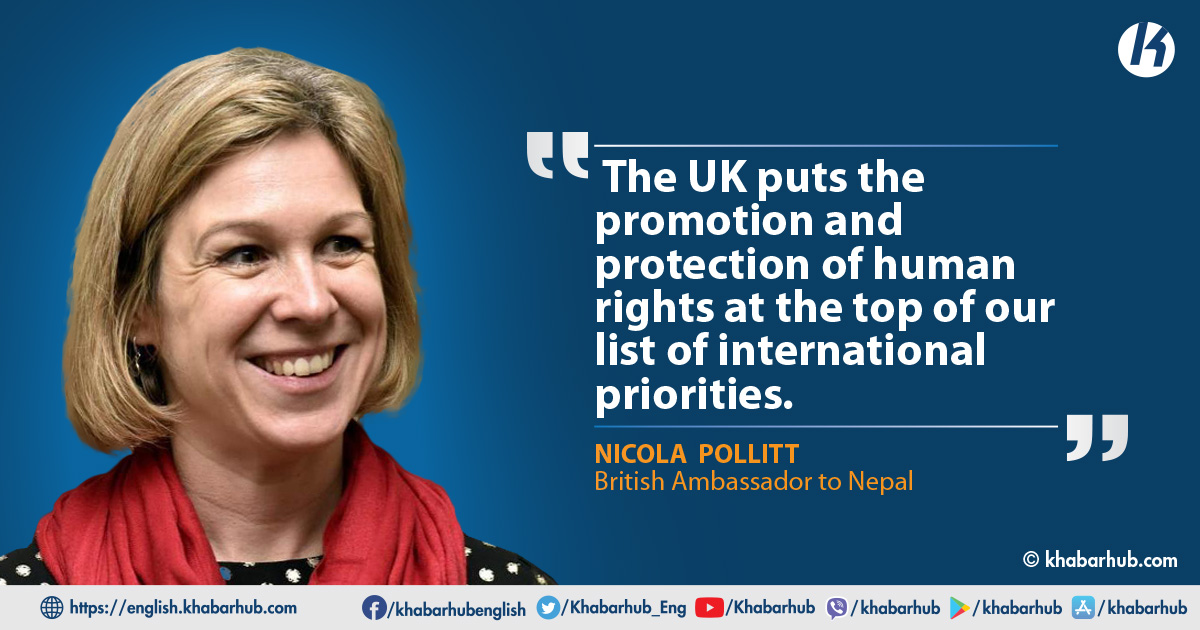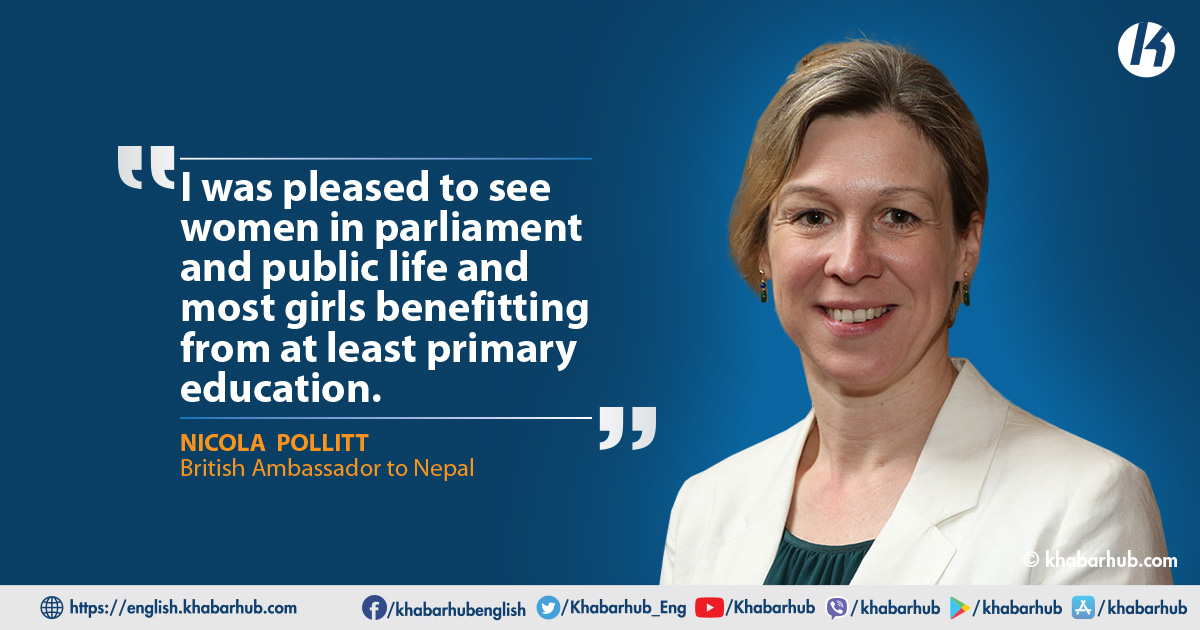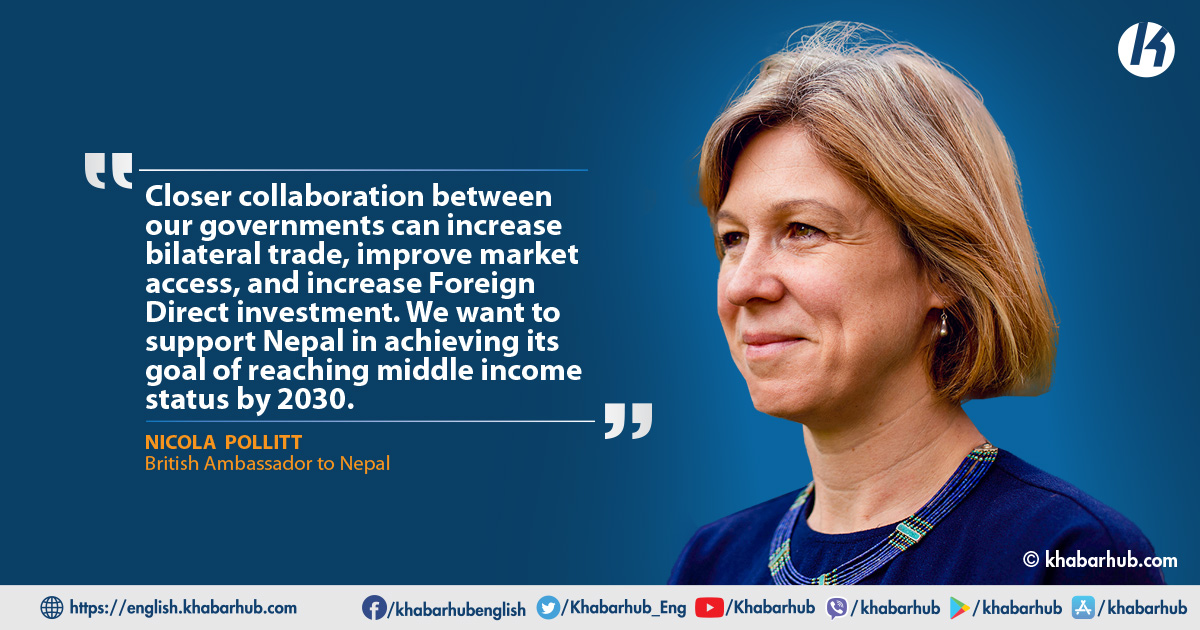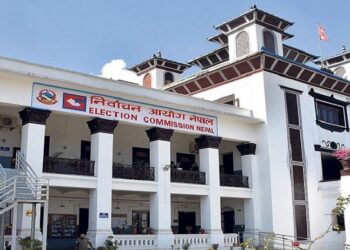Relations between Nepal-UK go back to centuries. The United Kingdom (UK) remains Nepal’s one of the largest donors and development partners.
Moreover, closer collaboration between the two governments can help increase bilateral trade besides improving market access, and increase Foreign Direct Investment. Nicola Pollitt, British Ambassador to Nepal, shares her views with Khabarhub’s Ishwar Dev Khanal on a range of issues. Excerpts:
How is Nepal treating you at this moment when the country has been overshadowed by the COVID-19 pandemic?
This is such a sad and difficult time for Nepal and for the Nepali people who are suffering so much from the impact of COVID-19.
My thoughts are with all those who are suffering, who have lost loved ones or who are caring for loved ones who are ill, or who have lost livelihoods as a result of this terrible pandemic.
My time here has definitely been dominated by the pandemic and on a personal level it has not been easy; twice now I have been separated from my very young children who have had to return to the UK.
But my colleagues at the British Embassy and I have all been focused on trying to support the Government of Nepal and the Nepali people to prevent, tackle and recover from COVID-19. As Nepal’s oldest friend, that is what we are here for in these difficult times.
The UK has been supporting Nepal in its bid to tackle COVID-19. Recently, Nepal received essential medical supplies from your country. Can Nepal expect more of such medical supplies or vaccines in the days to come?
Last year when COVID-19 first hit Nepal, we shifted the focus of most of our programmes, amounting to £40m, to support the Government of Nepal and local communities and help them respond to COVID-19.
In the face of this second wave, we were really pleased to be able to further help Nepal by bringing in much-needed ventilators donated by the UK government.
We have also funded an oxygen plant, and extra COVID wards in Pokhara and Bhaktapur, as well as medical supplies to hotspots around the country.
With our help, the Government has put together a list of priority supplies needed. We are coordinating closely with international partners to make sure that Nepal receives those supplies from around the world.

Let me take you some 20 years back when you were in Nepal. What was then, and now?
Nepal is one of the most beautiful countries in the world and the Nepali people are some of the most friendly I have ever met.
That was so 20 years ago and is so now. My short trip in 1999 to walk the Annapurna circuit left fond memories and I was delighted to be returning 20 years later as Ambassador.
Nepal has developed so much since then. Electricity, piped water and road access have reached so many who did not have it before and Kathmandu, in normal times, is a buzz of cafes and restaurants and modern life which was a delight to have seen spring up.
I was pleased to see women in parliament and public life and most girls benefitting from at least primary education.
Sadly, like in many countries, air pollution has worsened and the effect of climate change is more visible everywhere. Tackling that and working to build on the progress made towards gender equality are priorities for the UK in Nepal.
Relations between Nepal and the United Kingdom go back to centuries. As an Ambassador, what are your priorities?
Nothing is more pressing at the moment than tackling the impact of COVID-19. But there are other challenges and opportunities that remain really important this year and beyond.
Climate change is one, and it is the British Government’s top international priority in the run-up to the international climate summit, COP26 at the end of the year.
We are working closely with the Ministry of Forests and the Environment to support policies that will help Nepal to reach its carbon-neutral ambitions.
And with development partners, we have put together a £7.4bn package of support for a green recovery, which will bring climate-friendly opportunities for growth and investment across the country.
Supporting the education sector is also a priority. Education is crucial to the graduation of Nepal to middle-income status by 2030 and we know that marginalized communities and girls, in particular, have lost the most learning as a result of the pandemic.
I am committed to seeing the rights of women and girls protected and enhanced, and their access to opportunities improved – through education, skills and employment. The UK provides support across all these areas in Nepal.
How do you plan to work to further enhance the relations between the two countries to ensure that your government would contribute more to Nepal’s development?
Closer collaboration between our governments can increase bilateral trade, improve market access, and increase Foreign Direct investment.
We want to support Nepal in achieving its goal of reaching middle-income status by 2030. To do that our programming will help to make federalism effective, encourage economic growth, help girls to go to school and remain there for 12 years of quality education, and help Nepal to be a leader in climate change.

Have you encountered any challenges in your work here in Nepal? If yes, what?
No work is without its challenges, and that’s been particularly acute during the pandemic. We have had to find different ways to do our work.
As a diplomat, I have missed the connections that in normal times I would have made travelling around the country and meeting new people every day.
But I have an outstanding team at the Embassy who is committed to building our partnership with Nepal in whatever way they can, and we have all found new ways of overcoming challenges.
DFID has been Nepal’s one of biggest donors. Is your government getting the expected outcome with the resources that you are putting in here?
The UK Government merged DFID and the Foreign Office together last year, and in Nepal we are now one British Embassy Team. That merger will help us have even more impact on our resources.
But the pandemic has reduced outcomes everywhere across the world. In March 2020 when the pandemic and lockdown started in Nepal, the UK repurposed much of its programming to mitigate the impacts, providing for example additional WASH stations reaching 400,000 people and providing cash and food vouchers to about 60,000 vulnerable people.
The key here is flexibility to respond and adjusting programming – and therefore outputs – to focus on priorities when needed.
How do you analyze the current status of the people-to-people contact between Nepal and Britain?
Our historic people-to-people ties – of Gurkhas, of diplomatic relations, of education, and even cuisine – mean that the people-to-people relationship goes from strength to strength.
The growing Nepali diaspora in the UK participate in all spheres of British society and was it not for Covid 19, the large numbers of British tourists coming to Nepal would, I think, be rising too.
I look forward to a time when British people can come back here again and experience this beautiful country and its people.
Could you explain a bit about the UK’s support to Nepal’s social sectors, including in education and health?
UK support to health focuses on essential services for mothers and babies across the country. So, for example, in spite of the pandemic during 2020, by paying for transportation services for 280,000 women in 2020, they gave birth in safe health facilities.
We have helped Comprehensive Emergency Obstetric and Neonatal Care facilities to become functional with cesarean services (87 in 2020), and UK funding for 36 One-Stop Crisis Management centers across the country has helped many women and children who have experienced various forms of gender-based violence.
In education, we have a number of programmes that encourage parents to educate their girls, especially in communities where girls are excluded from being educated.
Nepal and the UK have, among others, one thing in common – both have woman Head of the State. How should a country like Nepal work to ensure that it has women leaders in the future?
Education is a critical building block. It gives opportunity, confidence, and decision-making control to girls and women.
That is why it is so important to make sure girls return to school when covid-19 permits and why the UK government is committed to getting 4m more girls into education globally. I also think role models are really important.
Change in any society takes time, and but when girls can see people like them in leadership roles it is easier to face the challenges and take the opportunities.
The UK is supporting women and girls in Nepal to take develop new skills through our skills for employment programme, to move into male-dominated fields through support to Girls in Tech and to celebrate and stretch those who are already role models, through support to female journalists.
How is your country working on gender equity with other development partners in Nepal?
Gender equality is a high priority for the UK as it is for other development partners. But this is an issue for Nepal, and external partners can only support and encourage.
We do that by ensuring that within our programs we find opportunities to achieve gender equality. This could be by ensuring that any barriers to women participating are reduced or by ensuring that men and women are paid equally in our programmes.
But, as a friend of Nepal we will speak up for what we think is right in terms of values and gender.
Do you have anything to comment on Nepal’s current political development?
It is not my role as Ambassador to comment on Nepal’s politics. The UK puts the promotion and protection of human rights at the top of our list of international priorities.
We place a particular focus on championing freedom of religion and belief; defending media freedom; and championing the values of liberal democracy.









Comment